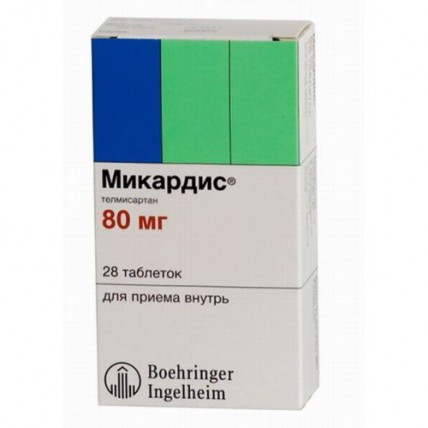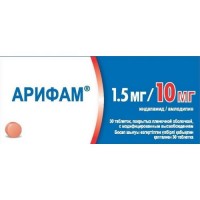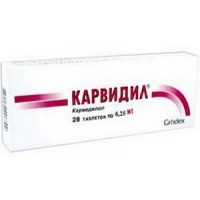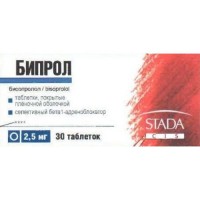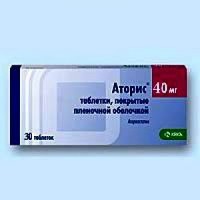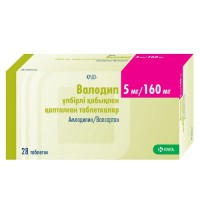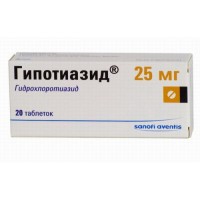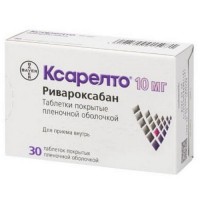Micardis® (Telmisartan) 80 mg, 28 tablets
- $26.40
What is Micardis® (Telmisartan) 80 mg?
Micardis® is a medication containing 80 mg of telmisartan, which is primarily used to treat high blood pressure (hypertension) and to prevent cardiovascular events in high-risk adults.
Telmisartan belongs to a class of drugs known as angiotensin II receptor blockers (ARBs), which work by relaxing blood vessels, allowing blood to flow more easily and lowering blood pressure.
What Are the Indications for Using Micardis®?
Micardis® is prescribed for:
- Hypertension: It is used to manage high blood pressure in adults, helping to prevent strokes, heart attacks, and kidney problems.
- Cardiovascular Risk Reduction: It reduces the incidence of cardiovascular events in adults with a history of atherosclerotic cardiovascular disease or type 2 diabetes mellitus with documented organ damage.
What Should Be Known Before Using Micardis®?
Contraindications
Micardis® should not be used in individuals who:
- Are allergic to telmisartan or any of its ingredients.
- Are in the second or third trimester of pregnancy.
- Have biliary obstructive disorders or severe liver impairment.
- Are taking aliskiren and have diabetes or impaired kidney function.
Drug Interactions
- Digoxin: Micardis® can increase digoxin levels, so monitoring is necessary.
- Potassium-Sparing Diuretics: Combining Micardis® with these or potassium supplements may lead to hyperkalemia (high potassium levels).
- Lithium: Co-administration may increase lithium toxicity.
- NSAIDs: Nonsteroidal anti-inflammatory drugs may reduce the antihypertensive effect of Micardis® and increase the risk of kidney problems.
What Are the Potential Side Effects of Micardis®?
While Micardis® is generally well-tolerated, some patients may experience side effects. Common side effects include:
- Infections: Upper respiratory infections and urinary tract infections.
- Blood Disorders: Anemia and thrombocytopenia.
- Metabolic Changes: Hyperkalemia, especially in patients with kidney issues or diabetes.
- Cardiovascular Effects: Hypotension (low blood pressure) and bradycardia (slow heart rate).
- Gastrointestinal Issues: Abdominal pain, diarrhea, and nausea.
Severe but rare side effects include:
- Angioedema: Swelling of the deeper layers of the skin, potentially life-threatening.
- Kidney Impairment: Including acute kidney failure.
- Liver Dysfunction: Especially in patients with existing liver conditions.
How Should Micardis® Be Used?
Dosage
For hypertension, the typical starting dose is 40 mg once daily, which may be increased to 80 mg depending on the response. For cardiovascular risk reduction, the recommended dose is 80 mg once daily. It may take four to eight weeks to achieve the maximum blood pressure-lowering effect.
Special Populations
- Elderly Patients: No dose adjustment is required.
- Patients with Kidney Impairment: A lower starting dose of 20 mg may be considered.
- Patients with Liver Impairment: Micardis® is contraindicated in severe liver impairment and should not exceed 40 mg daily in those with mild to moderate liver issues.
What Precautions Should Be Taken When Using Micardis®?
- Hydration: Ensure adequate hydration, especially in elderly patients or those with kidney issues, to avoid hypotension.
- Electrolyte Monitoring: Regular monitoring of potassium levels is advised due to the risk of hyperkalemia.
- Pregnancy and Breastfeeding: Micardis® should not be used during pregnancy or breastfeeding. If pregnancy is detected, discontinue use immediately.
How Should Micardis® Be Stored?
Micardis® should be stored in its original blister packaging to protect it from moisture.
Keep it at room temperature, between 15°C to 30°C (59°F to 86°F).
What to Do in Case of an Overdose?
Symptoms of overdose may include hypotension and tachycardia.
Treatment should focus on supportive measures, such as fluid and electrolyte management.
Hemodialysis is not effective in removing telmisartan from the blood.
